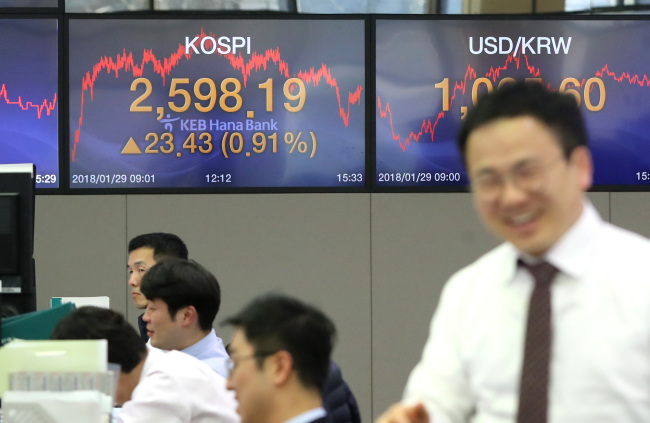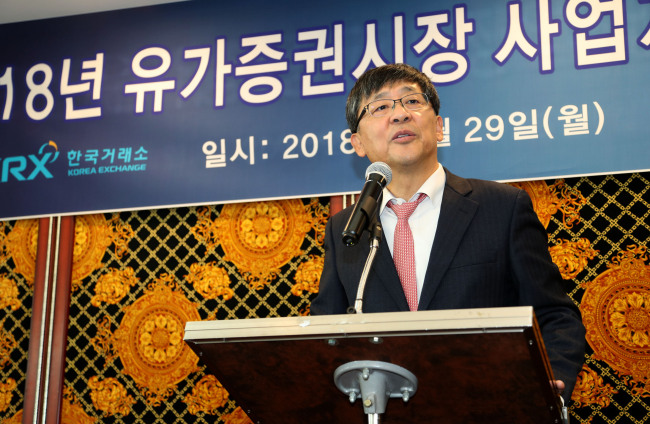Both stock markets in South Korea, the Kospi and Kosdaq, rallied Monday to hit records, while the nation’s market operator vowed to improve Kospi operations and become more friendly to foreign investors this year.
The top-tier Kospi closed at 2,598.19, up 0.91 percent from Friday, setting a new all-time high. The second-tier Kosdaq closed at 927,05, up 1.53 percent from the previous trading day, the highest in 16 years since March 2002.
The Kospi topped 2,600 for the first time in history during trading, hitting an intraday high at 2,607.10 at around noon. The Kosdaq rode a strong uptrend in late afternoon trade.

(Yonhap)
On the Kospi, foreigners and institutional investors net purchased shares worth 321.8 billion won ($301.3 million) and worth 359.6 billion won, respectively, overwhelming net sales of retail investors worth 710.6 billion won.
The Kosdaq rally stemmed from retail investors’ buying spree. Individual investors net bought 188.3 billion won worth of shares, dwarfing net sales of 88.2 billion won by foreign investors and 76.8 billion by institutional investors.
Large firms took gains in both markets. Kospi market bellwether Samsung Electronics’ common stocks and preferred stocks rose 0.9 percent and 1.6 percent, respectively. Also on the Kospi, Hyundai Motor gained 1.3 percent, while LG Chem went up 1.4 percent.
By sector, the Kospi-listed refiners like S-Oil and SK Innovation rose 6.9 percent and 6.1 percent, respectively.
On the Kosdaq, biotech giants rallied. Celltrion and Celltrion Healthcare, No. 1 and No. 2 in market cap, jumped 9.4 percent and 6.8 percent, respectively. Another biotech firm ViroMed surged 5.7 percent.
There were views Sunday that sluggish sales of the iPhone X might dent earnings forecast for semiconductor part makers in Korea. But Monday’s rally despite the negative outlook indicated that the views were “already reflected in the prices of tech shares for a month,” said Noh Geun-chang, an analyst from HMC Investment Securities. The semiconductor sector of the Kospi and Kosdaq took a combined 0.7 percent gain Monday.
The rally came in sync with a set of measures to tackle information asymmetry among investors by consolidating channels for market information, lower barriers for initial public offering and stimulate growth of exchange-traded funds or exchange-traded notes. These measures were unveiled Monday by the Korea Exchange, operator of both the Kospi and Kosdaq.

Lee Eun-tae, President & CEO of Kospi Market Division in the Korea Exchange. (The Korea Exchnge)
Moreover, the KRX vowed to incentivize underwriters by allowing them to obtain stocks of a firm ahead of an initial public offering on the Kospi before the firm’s offering price is fixed, through what the KRX dubbed as a “cornerstone policy.” In addition, the market operator said it plans to benchmark market models involving dealers like designated market makers in the New York Stock Exchange or designated sponsors in Deutsche Borse, in order to advance from the Kospi’s current order-driven market model.
As for foreign investors, English-language materials about dividends, corporate governance structures and investor relations of Kospi-listed firms, as well as changes in market policy on the Kospi, will be available starting this year. Following the plan, foreign mutual funds or securities investment trusts will be able to directly purchase sovereign bonds in Korea.
The KRX seeks to implement the measures by no later than the end of this year, but detailed schedules for each measure were not available.
As for the anticipated foreign capital flight following a tax revision, the KRX acknowledged that the issue will trigger “market impact,” but has yet to lay out plans to deal with it.
Through a revision of the tax enforcement decree effective starting July, capital gains tax will be imposed on a wider range of foreign investors from nations that do not have a tax treaty with Korea.
Moreover, the volume of capital gains tax will be larger.
By law, the capital gains tax amounts to the lower of the two -- 22 percent of net capital gains, or 11 percent of gross sales proceeds.
However, tax-withholding securities firms in Korea cannot calculate the 22 percent of net capital gains due to a lack of infrastructure and therefore only have the choice of 11 percent of sales proceeds, meaning a foreign investor must pay taxes even if they take losses in investment.
By Son Ji-hyoung
(
consnow@heraldcorp.com)







